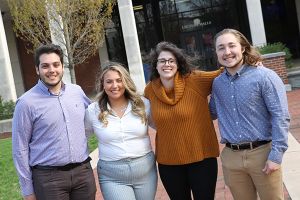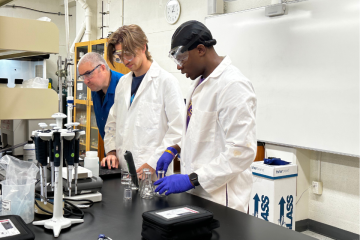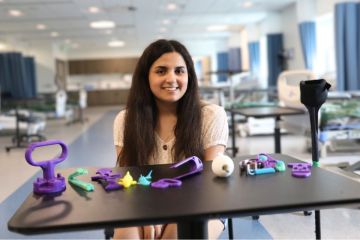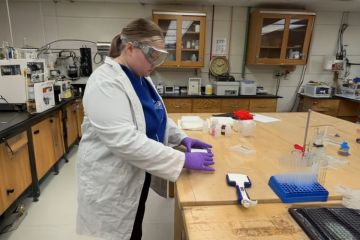Research Takes Bite Out of Unknown

Basic science explains the body’s physical response to hunger. When the body begins to experience hunger, it sets off a series of reactions that send signals to the brain triggering that it’s time to eat.
But what drives the psychological response, specifically the food choices made while hungry? Are the same choices made during a state of hunger versus satiety?
Luke Ayers, assistant professor of psychology, is investigating this query with the help of psychology student-researchers.
“You always hear the old adage ‘never go to the grocery store hungry,’ so my research at Widener is aimed at evaluating how accurate that statement actually is,” said Ayers.
Ayers’ research objective is to determine what influences our choice in the foods we eat. Do factors like personal preference, dietary needs, health goals or habits drive our food choices? And, perhaps more importantly, are these choices altered by states like hunger, stress, or even recent experiences? Ultimately, Ayers hopes that through understanding how these factors relate, we can better manage our health behaviors.
Over the past year, the Ayers lab has conducted experimental research to gather baseline data to determine how hunger affects food perception. Widener undergraduate students have been part of the study. Participants – who were randomly assigned to either fast for six hours before the experiment or not – were asked to first share their health behaviors in a survey and then look at a series of food images. After each image, the participants had to give a rating on three qualities: palatability or “tastiness,” likelihood that the person would eat the food if available in that moment, and perceived healthiness.
Study results offered tremendous insight. One unexpected finding suggested that hunger may actually change how likely we are to want to eat certain foods, without changing how we think about them in terms of healthiness or “tastiness.” Hunger also increased the reaction times for only those likelihood ratings, an interesting finding as traditionally individuals respond faster to things that actually motivate their behavior.
Taken together, these findings suggest that hunger may cause people to want or desire foods more, even though an individual’s feelings toward food hasn’t changed. These discoveries beg the question: what if hunger makes us more impulsive in our eating, even though we think we are in control?
Ayers designed his lab as a truly collaborative space to allow the four undergraduate research assistants to not only participate, but lead the research. From developing and executing research protocols, the students gain real-world training in experimental psychology.
Student-researcher Vasilis Ikonomou ’19 has partnered with Ayers since day one. As a psychology major, Ikonomou wanted to explore hands-on learning from both a research and clinical approach.
For Ikonomou and the other students, working alongside Ayers presented a valuable research opportunity on a complex topic and an introduction to a career in medical and mental health research.
“I always wanted to see ‘would I be good in research or would I be good in the clinical field,’ and so I tried to get experience in both,” Ikonomou explained. “At the time when Dr. Ayers came to me… it wasn’t just the opportunity to conduct research, but the interest of better understanding some of the factors that go into the choices we make. When the topics of food choice and health behaviors were discussed, I immediately knew that this was the field for me.”
Ikonomou presented the study findings on a number of occasions, including most recently at the scientific research honor society’s Sigma Xi conference. From the in-depth research to the close mentorship from Ayers, Ikonomou says the experience has prepared him for graduate school, where he plans to pursue a career as a neuropsychologist and conduct clinical research.
As a student, you hope to gain these kinds of experiences. After doing this amazing research for three years, I was able to redefine my interests in the field of psychology and apply to grad schools with a better understanding of how important research is in this field. — Vasilis Ikonomou ’19
The preliminary data has opened the doors to further investigation. Ayers and his team are at the beginning stages of investigating whether or not there are predetermined factors – such as food preference based on dietary preference or history – that can affect food selection while hungry.
The current and future findings can offer widespread health benefits, particularly for the more than one-third of adults in the United States that are considered obese. Obesity poses numerous health risks, including heart disease, stroke, Type-II diabetes, and certain types of cancer. Harnessing the knowledge of how internal and external influences relate and cause overeating can be life changing for many.
Ayers and Ikonomou anticipate their research can provide insight into how to control the underlying motivators that can result in poor behaviors toward food and unhealthy lifestyles.
“Eating, like a lot of human behavior, is influenced by many things outside of our conscious control. Yet we are so quick to judge ourselves and each other. My hope is that by understanding these factors we can make everyone happier and healthier,” Ayers added.
Now that’s some food for thought.




